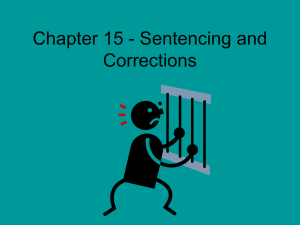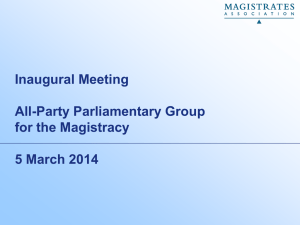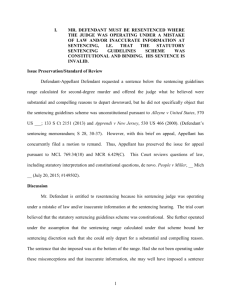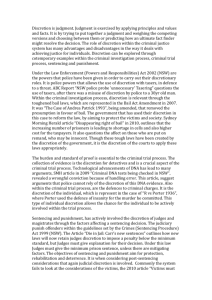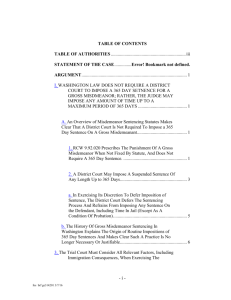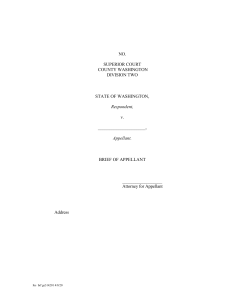Sentencing Motion - Washington Defender Association
advertisement
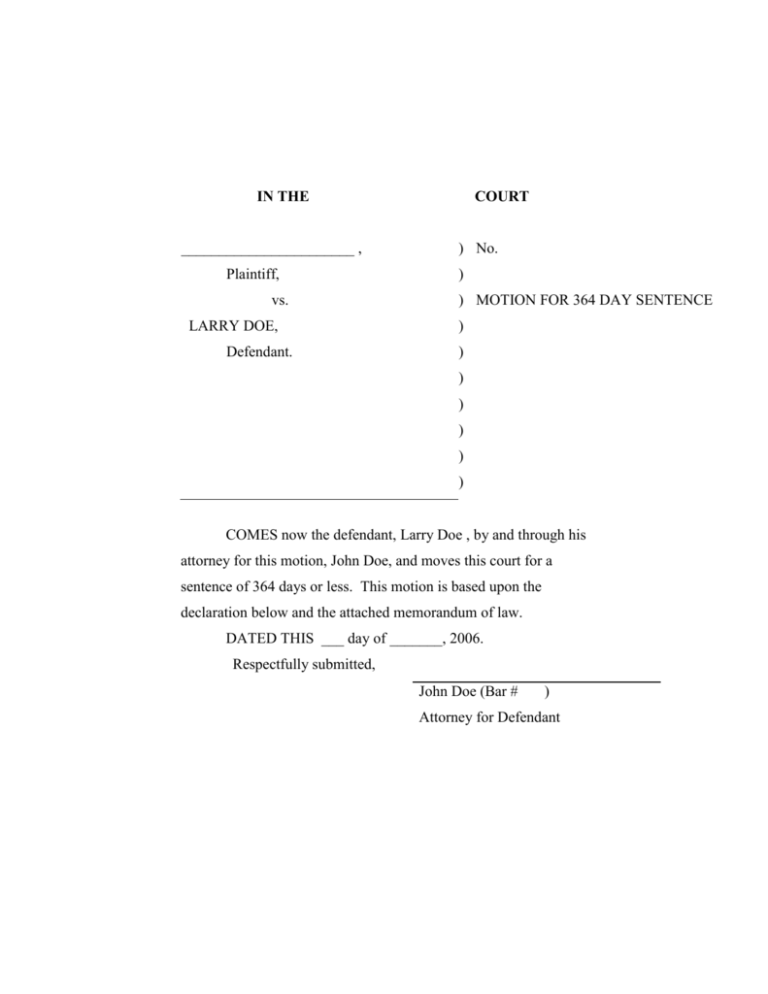
IN THE _______________________ , Plaintiff, vs. LARRY DOE, Defendant. COURT ) No. ) ) MOTION FOR 364 DAY SENTENCE ) ) ) ) ) ) ) COMES now the defendant, Larry Doe , by and through his attorney for this motion, John Doe, and moves this court for a sentence of 364 days or less. This motion is based upon the declaration below and the attached memorandum of law. DATED THIS ___ day of _______, 2006. Respectfully submitted, John Doe (Bar # ) Attorney for Defendant ARGUMENT It is axiomatic that Washington judges must exercise discretion in sentencing and may not do so in “an arbitrary or unreasonable manner.” State v. Cunningham, 96 Wn. 2d 31, 34-35, 633 P.2d 886 (1981). A sentencing judge has an “obligation to make the punishment fit the man rather than the crime.” State v. Harris, 10 Wn. App. 509, 513, 518 P.2d 237 (1974). Washington cases routinely refer to a judge’s duty to exercise discretion at sentencing. See, e.g., Harris, 10 Wn.App. at 513 (“[w]hen criminal penalties are not fixed by statute other than by establishing maximum and minimum terms of servitude…a trial judge must necessarily exercise judicial discretion when imposing sentence”). The duty to exercise discretion during sentencing means that a trial judge must examine factors specific to each individual and his/her case before imposing a sentence. The Court of Appeals has emphasized that a sentencing court should possess and consider as much information specific to the defendant as possible. Harris, 10 Wn.App. at 512. See also State v. Russell, 31 Wn. App. 646, 648, 644 P.2d 704 (1982) (sentencing judge must possess the fullest information possible concerning the defendant’s past life and personal characteristics.); State v. Balkin, 48 Wn.App. 1, 4, 737 P.2d 1035 (1987) (in determining the proper sentence, a trial court is vested with broad discretion and "'can make whatever investigation [it] deems necessary or desirable); State v. McGill, 112 Wn. App. 95, 47 P.3d 173 (2002) (judge who expressed dismay because he believed he could not impose exceptional felony sentence below standard range based on disproportional nature of standard range for drug related felonies failed to exercise discretion); Quintero-Morelos, 133 Wn.App. at 600 (taking interaction between state court sentence and federal law into account is part of “traditional sentencing discretionary authority”). A court abuses its discretion when acting under the mistaken belief that it may not impose a sentence of less than 365 days for purposes of avoiding federal immigration consequences. A court acting under a mistaken belief that it may not exercise discretion abuses its discretion. State v. McGill, 112 Wn.App. 95, 100, 47 P.3d 173 (2002). The McGill Court found that “the trial court refused to exercise its discretion because it erroneously believed it lacked authority to do so” and remanded for resentencing. McGill, 112 Wn. App. at 100. See also In re Mullholand, 161 Wn.2d 322, 333-34, 166 P.3d 677 (2007) (remand for re-sentencing appropriate if appellate court cannot say sentencing court would have imposed the sentence it did if it had properly understood sentencing law). A policy of routine imposition of a fixed sentencing period of 365 days amounts to an abuse of discretion. Cunningham, 96 Wn.2d at 36 (use of a fixed sentencing policy was unjustifiable and would constitute an abuse of discretion); State v. Perdang, 38 Wn.App. 141, 146, 684 P.2d 781 (1984) (failure to consider a certain type of sentence or resolution is “an abdication of the responsibility to exercise discretion; State v. GarciaMartinez, 88 Wn.App. 322, 330, 944 P.2d 1104 (1997) (abuse of discretion to refuse categorically to impose sentence below standard range); State ex rel. Carroll v. Junker, 79 Wn.2d 12, 26, 482 P.2d 775 (1971) ( judicial discretion “means a sound judgment exercised with regard to what is right under the circumstances and without doing so arbitrarily or capriciously”). Routine imposition of 365 day sentences falls short of this standard in that it fails to consider the highly relevant circumstance of the impact of immigration consequences (e.g. deportation) on the defendant and her/his family and, thus, constitutes an arbitrary and capricious exercise of judicial power. Washington courts recognize that it is appropriate for judges to consider a defendant’s immigration status when imposing a sentence. The Washington Supreme Court has held a defendant’s immigration status is a legitimate and relevant factor that can help a trial court determine an appropriate sentence . State v. Osman, 157 Wn.2d 474, 139 P.3d 334 (2006) (Likelihood of defendant’s deportation for incest convictions would render SSOSA treatment unworkable and consideration of immigration consequences did not violate equal protection); QuinteroMorelos, 133 Wn.App. at 600 (trial court granted a post conviction motion to modify defendant’s sentence to 364 days, explaining that had defense counsel provided the court with information regarding the immigration consequences of a 365 day sentence the court would have imposed a 364 day sentence at the original sentencing hearing). In so doing, the Court of Appeals noted: [F]ederal law has the potential to influence the actual punishment visited upon a criminal defendant in state court. State court judges often make decisions mindful of federal implications. Quintero-Morelos, 133 Wn. App. at 600. II. CONCLUSION For the reasons stated above the defendant requests that the court impose a sentence of 364 days or less. DATED this ______ day of _______, 200___. By ____________, WSBA No. _________ Attorney for Defendant
